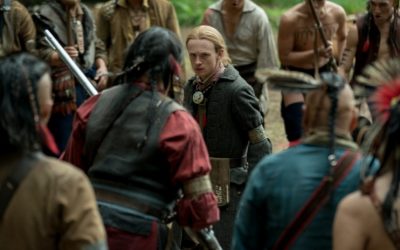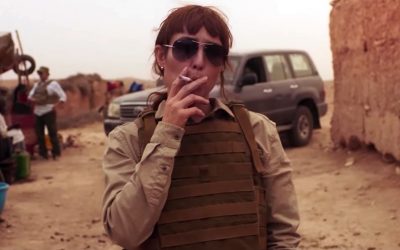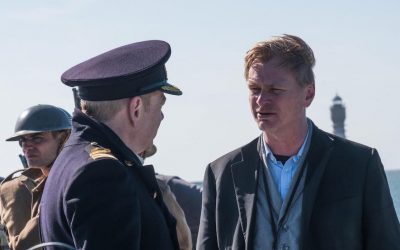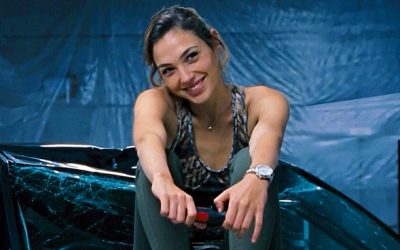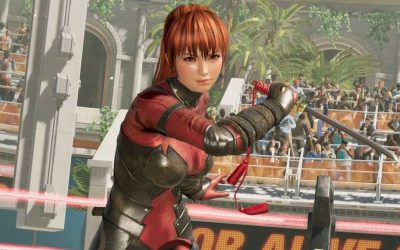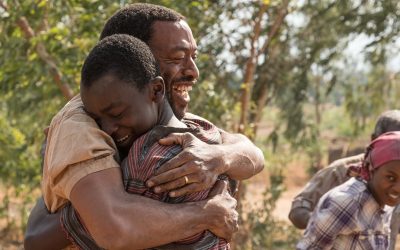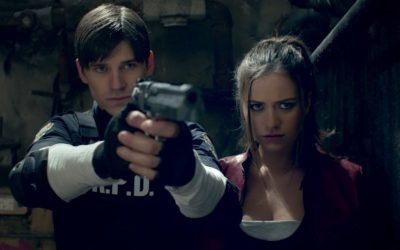
Outlander season 4 episode 13 review: Man Of Worth
Kayti Burt
Jan 28, 2019
The Outlander season 4 finale was characteristically uneven, with some real highs and a few lows. Spoilers ahead in our review…
This review contains spoilers. See related
…
Outlander season 4 episode 13 review: Man Of Worth
Kayti Burt
Jan 28, 2019
The Outlander season 4 finale was characteristically uneven, with some real highs and a few lows. Spoilers ahead in our review…
This review contains spoilers. See related
…
Netflix’s Close director on ‘bringing authentic women to action movies’
Director Vicky Jewson on how one of the world’s top female bodyguards helped keep her Noomi Rapace-starring Netflix thriller true to life
Noomi Rapace is no stranger to onscreen action. But in Close, her third Netflix collaboration (after Bright and What Happened To Monday), she really ups the ante – and the authenticity.
Rapace plays Sam, a bodyguard – or close protection officer – who’s assigned to protect the young daughter of an oil magnate from the mysterious forces out to get her. The interesting thing is, Rapace’s character is actually based on a real-life protector: Jacquie Davis, the UK’s first female bodyguard, whose clients over the years have included Hollywood stars, royalty and even JK Rowling.
“We made up the story, but Jacquie was the inspiration for Sam,” confirms Brit director/co-writer Vicky Jewson when Den of Geek catches up with her to chat about the film. “I thought it would be great fun to take a hardened bodyguard with a lot of personal issues and chuck her in with a VIP heiress who’s the complete opposite. As a director, I really want to bring layered, authentic women to the action genre.”
The story might be made up, but the action isn’t. Davis served as a consultant on the film and even trained Rapace herself (“She was so good, I’d give her a job!” the bodyguard told Sky News). The actress grabbed the role with both hands, even going so far as to do all her own stunts… “There was no double,” says Rapace. “It was very intense and I hurt myself.”
“She is very, very committed,” says Jewson. “She did a lot of physical training and fitness training – that was her way of getting into the role. Her sister is her personal trainer. We’d be shooting action all day in the heat, and then she’d text me from the gym afterwards doing a two-hour workout. I thought, ‘You’re mad!'”
Here, Jewson tells DoG about the challenges Rapace faced on set, how Davis kept the film authentic and why she loves making action movies, as well as the potential for a possible sequel…
The film takes a lot of inspiration from Jacquie Davis. How did you first get the idea of doing a film based on her experiences?
I was researching women who have jobs that are dangerous or a bit extraordinary, and I came across an article in The Telegraph about Jacquie. So I arranged to meet her in a pub in East London; we chatted and I felt like I was getting an insight into this underground world. She travelled all over the world to protect people: close protection, hostage rescue, undercover surveillance… I felt like there were 15 movies to be made from her life experiences! So that really was the jumping-off point.
And she was involved all the way through filming, right?
She was really hands-on. She was a consultant on the script, so we got the authenticity into each scene – things like how someone would get taken, how you would defend yourself… She took Noomi on a very intensive close protection course, so she could learn how to walk with the principal, how to do evasive drivng, weapons training…all of it. Jacquie was on set a lot of the time, making sure we kept it authentic. Occasionally, she’d say, “That would never happen.” So we’d scrap what we were doing and start again! For me, it was really important to make it feel real.
It seems like Noomi threw herself into the project – how hard did you have to pitch it to her?
She was my first choice. We both just immediately clicked; we shared the same vision for what we wanted this film to be. And we have this great chemistry and trust in each other – we’ve become a real partnership, which has been great. I think the reason I was drawn to her is she has this emotional honesty in all of her work, so you get this deep credibility that she brings to characters.
The action sequences in the film feel very natural, even improvised – how much did you have to choreograph them?
Well I’m a big believer in pre-vis[ualisation], and not in a fancy computer animated way; in a shoot on my iPhone with the stunt coordinator and play with various ideas kind of way. We wanted that improvised feeling so that the action felt real and that’s something that Julian Spencer, the stunt coordinator, and I really clicked over. He loves that raw, brutal feeling. But obviously, the reality is you plan out those scenes because, particularly on a film like this, we didn’t have a long shooting schedule.
So, for example, the scene where Sam takes down a guy with her hands tied behind her back – we had one day to shoot that entire sequence. We’d mapped all out and rehearsed it, but I think the spontaneity came in the rehearsal process. I’d talk to Julian about what I wanted, and then often he’d start from a place where he’d say, “OK, Noomi, I’ve got two guys outside who are ex-SAS, they’re going to come in here and attack you, show me what you can do.” And she’d be like, “What the hell is this guy on about?” [Laughs] He likes to bring that reality to the screen, so he likes to give the actors a toolkit of moves and then leave a bit of space for some unexpected surprises.
It seems like, with the success of Bodyguard, there’s an appetite for stories like this. Were you aware of that when you were in production?
I actually had no idea about the Bodyguard TV show until it came on the telly. This film has been four years in the making. But I think what Bodyguard did was to stir up people’s interest in that world of close protection. It’s a very untapped world in terms of film and TV stories. There’s so much material there and I think a female bodyguard is quite a unique perspective on that, which is I suppose another thing in the zeitgeist at the moment – that huge movement, which I do think is really helping.
It’s a very female-focused movie, both in front of and behind the camera. It seems like a perfect time to get more of these stories out there…
Exactly. I mean I feel like hopefully, we’ll reach a point where there are as many of these films as there are male-focused action thrillers. I grew up watching all the action movies of the 80s and 90s, which I loved, but there weren’t really any women in those roles, so I just wanted to make films that I wanted to see. That’s where I come from with it. I feel like there is something very empowering to be able to watch a woman in that role. You know, they fail and it’s ugly to watch sometimes, but they persevere. For me, it was important that they felt like real people because I think sometimes with the girl with the gun, you can end up relying on sexuality. I wanted to do something more authentic.
There’s a sense of defiance to the film, especially when Noomi’s character is telling her young principal to “fight back”. Would that really happen?
That’s actually something that Jacquie told us when we were doing the research: you always tell your principal that the moment they get you in a car or a vehicle, your opportunity to survive drops by 60 per cent – so you have to do absolutely everything you can before that happens. I thought that was really interesting, that will to survive and that window that you have.
Is action a genre that you’d like to explore more as a director?
I would love to keep making action films, as long as they have a strong character at the heart of them. That’s the key for me, so you can really connect with the story. I like making emotional action films. I grew up making action films with my mates – it’s a great genre.
With that in mind, what’s next? Another action film?
I’m writing at the moment with my writing partner, Rupert [Whitaker]. We’re writing a script about Sylvia Raphael, who was one of the best female Mossad spies in the 70s. Her life story is amazing. We’re currently on draft one of that. Noomi would play Sylvia, so we’re both quite excited about it.
You mentioned that Jacquie has lots of stories – could any of them spin out into a sequel for this character?
Yeah, I mean I would love that. Jackie wrote a book called The Circuit, which is a really great book about how she became a bodyguard, her day-to-day life in the job and all the missions she’s been on, and we’ve literally just acquired the rights to that. The goal is that it’s there, so we can make more stories in this world. How we’re going to do that, we haven’t decided at the moment – whether it will be a TV route or another film… But it’s definitely something that we’re interested in.
Close is streaming on Netflix now
Netflix’s Close director on ‘bringing authentic women to action movies’
Director Vicky Jewson on how one of the world’s top female bodyguards helped keep her Noomi Rapace-starring Netflix thriller true to life
Noomi Rapace is no stranger to onscreen action. But in Close, her third Netflix collaboration (after Bright and What Happened To Monday), she really ups the ante – and the authenticity.
Rapace plays Sam, a bodyguard – or close protection officer – who’s assigned to protect the young daughter of an oil magnate from the mysterious forces out to get her. The interesting thing is, Rapace’s character is actually based on a real-life protector: Jacquie Davis, the UK’s first female bodyguard, whose clients over the years have included Hollywood stars, royalty and even JK Rowling.
“We made up the story, but Jacquie was the inspiration for Sam,” confirms Brit director/co-writer Vicky Jewson when Den of Geek catches up with her to chat about the film. “I thought it would be great fun to take a hardened bodyguard with a lot of personal issues and chuck her in with a VIP heiress who’s the complete opposite. As a director, I really want to bring layered, authentic women to the action genre.”
The story might be made up, but the action isn’t. Davis served as a consultant on the film and even trained Rapace herself (“She was so good, I’d give her a job!” the bodyguard told Sky News). The actress grabbed the role with both hands, even going so far as to do all her own stunts… “There was no double,” says Rapace. “It was very intense and I hurt myself.”
“She is very, very committed,” says Jewson. “She did a lot of physical training and fitness training – that was her way of getting into the role. Her sister is her personal trainer. We’d be shooting action all day in the heat, and then she’d text me from the gym afterwards doing a two-hour workout. I thought, ‘You’re mad!'”
Here, Jewson tells DoG about the challenges Rapace faced on set, how Davis kept the film authentic and why she loves making action movies, as well as the potential for a possible sequel…
The film takes a lot of inspiration from Jacquie Davis. How did you first get the idea of doing a film based on her experiences?
I was researching women who have jobs that are dangerous or a bit extraordinary, and I came across an article in The Telegraph about Jacquie. So I arranged to meet her in a pub in East London; we chatted and I felt like I was getting an insight into this underground world. She travelled all over the world to protect people: close protection, hostage rescue, undercover surveillance… I felt like there were 15 movies to be made from her life experiences! So that really was the jumping-off point.
And she was involved all the way through filming, right?
She was really hands-on. She was a consultant on the script, so we got the authenticity into each scene – things like how someone would get taken, how you would defend yourself… She took Noomi on a very intensive close protection course, so she could learn how to walk with the principal, how to do evasive drivng, weapons training…all of it. Jacquie was on set a lot of the time, making sure we kept it authentic. Occasionally, she’d say, “That would never happen.” So we’d scrap what we were doing and start again! For me, it was really important to make it feel real.
It seems like Noomi threw herself into the project – how hard did you have to pitch it to her?
She was my first choice. We both just immediately clicked; we shared the same vision for what we wanted this film to be. And we have this great chemistry and trust in each other – we’ve become a real partnership, which has been great. I think the reason I was drawn to her is she has this emotional honesty in all of her work, so you get this deep credibility that she brings to characters.
The action sequences in the film feel very natural, even improvised – how much did you have to choreograph them?
Well I’m a big believer in pre-vis[ualisation], and not in a fancy computer animated way; in a shoot on my iPhone with the stunt coordinator and play with various ideas kind of way. We wanted that improvised feeling so that the action felt real and that’s something that Julian Spencer, the stunt coordinator, and I really clicked over. He loves that raw, brutal feeling. But obviously, the reality is you plan out those scenes because, particularly on a film like this, we didn’t have a long shooting schedule.
So, for example, the scene where Sam takes down a guy with her hands tied behind her back – we had one day to shoot that entire sequence. We’d mapped all out and rehearsed it, but I think the spontaneity came in the rehearsal process. I’d talk to Julian about what I wanted, and then often he’d start from a place where he’d say, “OK, Noomi, I’ve got two guys outside who are ex-SAS, they’re going to come in here and attack you, show me what you can do.” And she’d be like, “What the hell is this guy on about?” [Laughs] He likes to bring that reality to the screen, so he likes to give the actors a toolkit of moves and then leave a bit of space for some unexpected surprises.
It seems like, with the success of Bodyguard, there’s an appetite for stories like this. Were you aware of that when you were in production?
I actually had no idea about the Bodyguard TV show until it came on the telly. This film has been four years in the making. But I think what Bodyguard did was to stir up people’s interest in that world of close protection. It’s a very untapped world in terms of film and TV stories. There’s so much material there and I think a female bodyguard is quite a unique perspective on that, which is I suppose another thing in the zeitgeist at the moment – that huge movement, which I do think is really helping.
It’s a very female-focused movie, both in front of and behind the camera. It seems like a perfect time to get more of these stories out there…
Exactly. I mean I feel like hopefully, we’ll reach a point where there are as many of these films as there are male-focused action thrillers. I grew up watching all the action movies of the 80s and 90s, which I loved, but there weren’t really any women in those roles, so I just wanted to make films that I wanted to see. That’s where I come from with it. I feel like there is something very empowering to be able to watch a woman in that role. You know, they fail and it’s ugly to watch sometimes, but they persevere. For me, it was important that they felt like real people because I think sometimes with the girl with the gun, you can end up relying on sexuality. I wanted to do something more authentic.
There’s a sense of defiance to the film, especially when Noomi’s character is telling her young principal to “fight back”. Would that really happen?
That’s actually something that Jacquie told us when we were doing the research: you always tell your principal that the moment they get you in a car or a vehicle, your opportunity to survive drops by 60 per cent – so you have to do absolutely everything you can before that happens. I thought that was really interesting, that will to survive and that window that you have.
Is action a genre that you’d like to explore more as a director?
I would love to keep making action films, as long as they have a strong character at the heart of them. That’s the key for me, so you can really connect with the story. I like making emotional action films. I grew up making action films with my mates – it’s a great genre.
With that in mind, what’s next? Another action film?
I’m writing at the moment with my writing partner, Rupert [Whitaker]. We’re writing a script about Sylvia Raphael, who was one of the best female Mossad spies in the 70s. Her life story is amazing. We’re currently on draft one of that. Noomi would play Sylvia, so we’re both quite excited about it.
You mentioned that Jacquie has lots of stories – could any of them spin out into a sequel for this character?
Yeah, I mean I would love that. Jackie wrote a book called The Circuit, which is a really great book about how she became a bodyguard, her day-to-day life in the job and all the missions she’s been on, and we’ve literally just acquired the rights to that. The goal is that it’s there, so we can make more stories in this world. How we’re going to do that, we haven’t decided at the moment – whether it will be a TV route or another film… But it’s definitely something that we’re interested in.
Close is streaming on Netflix now
Detective Pikachu sequel already in development
Alec Bojalad
Jan 28, 2019
Legendary Entertainment has ordered a script for a Detective Pikachu sequel months before the original debuts.
How are we gonna catch ’em all if we can’t even move past Pikachu?
Legend…
Magnum P.I. has been renewed for season 2
Alec Bojalad
Jan 28, 2019
CBS sees the spirit of Tom Selleck in Jay Hernandez and orders Magnum P.I. season 2…
Maybe that Magnum P.I. reboot wasn’t such a bad idea after all. See related
…
Christopher Nolan’s next film will arrive in July 2020
David Crow
Jan 26, 2019
The new Christopher Nolan film, without a title or a cast, has already become the must-see movie of July 2020
Christopher Nolan is one of those rare directors who can get a major summer …
Fast And Furious female-led spinoff movie confirmed by Vin Diesel
Vin Diesel has confirmed that Universal is shifting gears toward a Fast And Furious spinoff movie headlined by a female cast.
The Fast And Furious film franchise is getting a female-led spinoff movie.
Star Vin Diesel has taken to Instagram to confirm that Universal is moving forward with his pitched plans for a Fast film entry that will showcase an unnamed female protagonist, potentially one that we’ve already seen in the franchise. It’s certainly a loaded clue, since the films have served as a platform for quite the array of prominent female alumni throughout its 18-year history.
View this post on InstagramA post shared by Vin Diesel (@vindiesel) on Jan 23, 2019 at 3:21pm PST
Diesel – pictured with his sister (and movie producer), Samantha Vincent – also gave a key “shout out” to a trio of scribes in Nicole Perlman, Lindsey Beer, Geneva Robertson-Dworet, seemingly identifying them as the creative coalition for the female-led spinoff effort, joining “the Fast Family.” It’s quite an impressive crew, seeing as Perlman worked on Marvel movies Guardians Of The Galaxy and March’s Captain Marvel, Beer penned the upcoming Tom Holland/Daisy Ridley sci-fi thriller, Chaos Walking, and Robertson-Dworet scripted the recent Tomb Raider reboot, and worked on Captain Marvel. Moreover, they are attached to a list of high-profile genre scripts such as Silver Sable, M.A.S.K., Dungeons & Dragons, another Teenage Mutant Ninja Turtles reboot and more.
So, who could be the spinoff’s female protagonist? Well, Michelle Rodriguez’s Letty Ortiz is probably the first contender who comes to mind, especially since she’s a franchise OG. However, she’s already fielded significant screen time, and the aspect of bankability could force her to cede that spot to Wonder Woman star Gal Gadot, whose character, Gisele, debuted in the fourth film, 2009’s Fast & Furious. However, the most recent release, 2017’s The Fate of the Furious, featured Oscar winner Charlize Theron as Cipher; another viable contender for sure. (Fast And Furiosa?) – Of course, lest we forget, there’s Jordana Brewster’s Mia Toretto, Helen Mirren’s Magdalene Shaw and Eva Mendes’s Monica Fuentes.
Regardless, the white-knuckle-rocking, speed-centric action films have an almost unfathomable number of miles on its muscle-car-teeming movies odometer, its sizable, $5 billion worldwide-earning back catalogue has done nothing to diminish its proverbial Kelley Blue Book value of box office viability. Indeed, while the main movie series appears to be winding down, marking the untitled Fast & Furious 10 as the finish line in 2021, its legacy is already set to continue this summer with spinoff movie Hobbs & Shaw, starring franchise vets Dwayne Johnson and Jason Statham. Now, it appears that the future of the Fast franchise’s expansion is literally female.
We will keep you updated on the Fast And Furious female spinoff as things develop!
Dead Or Alive 6 still has revealing costumes
Dead Or Alive 6 will feature the series’ famous revealing costumes, despite rumours they’d been toned down…
Dead Or Alive 6 may look like it’s toned down some of the more stimulating elements of past titles, but Team Ninja says that isn’t actually true.
“The thing is, DOA was developed with a new game engine, and the new game engine was developed together with the game,” said game director Yohei Shimbori, in an interview with Eurogamer, regarding early indications the game’s sexualised elements had been toned down.
“So, it was just that the physics weren’t ready last year at E3… The first costumes you get when you start playing are the ones with the less physics and the most coverage of skin. When you start the game, the others need to be unlocked. You go to the quest mode, you earn coins and then you have to unlock the other costumes.”
Shimbori goes on to say that things like revealing costumes and exaggerated physics are “part of the legacy of DOA” and that “If you lose this, the core fans would move away.”
The discussion regarding the reaction of the fans is quite interesting when you consider that some series fans have already indicated that they are disappointed in the upcoming title over the assumption that they had catered to peer pressure and removed certain controversial elements. It seems that isn’t quite the case. Instead, it sounds like the team has decided to move those controversial features from the foreground to the background. Shimbori said that he blames some of the reaction on the highly-sexualised DOA Extreme series and expresses his wishes that everyone just moves on from the subject.
“We are honouring the long-term fans and making sure they also get what they expect,” said Shimbori. “We would really appreciate it if the media would focus more on the topic of we are building a good game here and not only focusing on this juggle talk.”
Furthermore, Shimbori reminds everyone that they can just disable the exaggerated physics and ignore the more revealing costumes if they choose to do so. For instance, he mentions that you can “stick with the schoolgirl uniform for Honoka” which he claims “will cover a lot.”
Dead Or Alive 6 reaches PlayStation 4, Xbox One and Windows on March 1st 2019.
New trailer lands for Chiwetel Ejiofor’s directorial debut
The Boy Who Harnessed The Wind will premiere at the Sundance Film Festival before heading to Netflix
Chiwetel Ejiofor is the latest big-name actor to turn his hand to directing with Netflix Original The Boy Who Harnessed The Wind. And now, thanks to a new trailer, we’ve got a first look at the Doctor Strange star’s initial foray behind the camera.
Based on the bestselling book, the film tells the true-life story of 13-year-old William Kamkwamba (played by newcomer Maxwell Simba) – a disadvantaged kid who puts his inventor’s brain to good use by building a windmill that can save his Malawian village from famine.
Ejiofor also stars as Kamkwamba’s down-on-his-luck dad, in what looks like a heartstring-tugging tale of overcoming adversity. You can watch the trailer below…
It’s proving to be a busy couple of years for Ejiofor – as well as unveiling his directorial passion project, he’ll also be voicing villain Scar in this summer’s The Lion King remake, as well as appearing opposite Angelina Jolie in Disney sequel Maleficent II and very probably reprising his role as Baron Mordo in the recently announced Doctor Strange 2.
The Boy Who Harnessed The Wind is getting its premiere at the Sundance Film Festival this week, before making its way to Netflix on 1 March 2019.
Nintendo Switch isn’t getting a successor or a price cut any time soon
Rob Leane
Jan 25, 2019
Shuntaro Furukawa confirms that following up or cutting the price of the Switch is not in his current plans
Shuntaro Furukawa, the president of Nintendo, has made it clear that the Ninten…
Resident Evil 2 pays tribute to George Romero with live action trailer
Rob Leane
Jan 25, 2019
George A. Romero made a live-action trailer for the original Resident Evil 2, and now the remake has its own version…
Capcom has continued its promotional campaign for Resident Evil 2 b…

